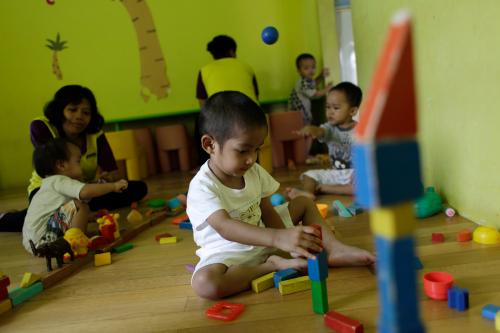At the start of the new year, my team and I reflected on the some of the events in the area of social and development impact bonds in 2016 and what lies ahead in 2017. The field continued to expand steadily over 2016, with the number of contracted impact bonds growing 21 percent to reach a total of 69 impact bonds globally across 16 countries and 10 sectors. Though there remain only two contracted impact bonds in developing countries, great progress was made in designing new transactions.
Overall, in 2016 we observed both successes and challenges among the first impact bonds implemented, new countries and new sectors enter into the market, a push toward legislative reform and government support for growing the market, and the rise of creative ideas for scaling up impact bond transactions in the future.
While there was much notable news in the field of impact bonds in 2016 across the globe, we want to highlight five important moments for impact bonds in developing countries:
- At the first public and live-streamed event on the global potential of impact bonds, practitioners from around the world agreed that impact bonds were well-suited to “middle-phase” financing, system building, and intensive learning.
- The Western Cape Province of South Africa became the first middle-income country government entity to commit outcome funding for impact bonds, with the Department of Social Welfare and Department of Health committing funding for three new social impact bonds for early childhood development.
- The world’s first development impact bond for education reported the results of its first year, showing a 23 percent improvement in learning for girls’ in Rajasthan, India, despite some program setbacks
- Practitioners working on impact bonds in emerging markets rolled up their sleeves together for the first time in an in-depth workshop in London, discussing the critical stages of deal development and the many challenges. (Keep an eye out for summary policy brief from Brookings and Convergence in 2017).
- The Ministry of Innovation, Science and Technology in the state of Jalisco, Mexico, committed to fund an impact bond for female-headed households. Together with the Ethos Laboratorio de Políticas Públicas in Mexico, we co-hosted an event on impact bonds in the Mexican market (policy brief to be released in March 2017).
In reflection, we are proud of the contributions that Brookings has made toward illuminating the value-add and risks of impact bonds, and payment by results more broadly, over this past year.
In reflection, we are proud of the contributions that Brookings has made toward illuminating the value-add and risks of impact bonds, and payment by results more broadly, over this past year. We note that discussions on the importance of impact bonds continue to come back to effective public sector management—effective contracting (we dive into this in a new paper on public-private partnerships in early childhood development and in our work on developing a standardized tool to cost early childhood interventions) and effective performance management (check out this tool for managing data in results-based financing projects). In particular, we have concluded that more research will be needed to evaluate the effects of a variety of results-based financing mechanisms relative to traditional input-based financing.
At Brookings, we look forward to another busy year of research, exploring the key levers to effective public sector management. In addition to conducting more extensive research within particular sectors and countries, we will continue to convene a variety of stakeholders globally for learning and sharing their experiences more broadly in the field of payment by results. Nine new impact bonds are expected to launch in low- and middle-income countries in 2017. We expect that another dozen or more will launch in high-income countries. We look forward to sharing all that we will certainly learn in 2017.





Commentary
5 highlights from impact bond activity in developing countries in 2016 (and a look to 2017)
January 13, 2017